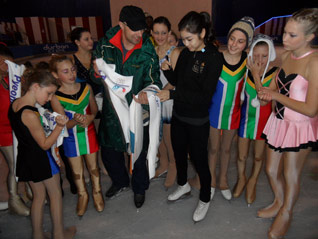There have been media reports that although PyeongChang 2018 promised that it would connect the country’s major airport in Incheon to the city with a 68-minute travel time during the 2018 Winter Olympic Games, the real travel time could take more than 93 minutes.
Also that the government has decided not to build a high-speed railway linking PyeongChang to the Incheon Airport, which the government has denied because it said it never made such a promise.
In a statement Tuesday the Ministry of Land, Transport and Maritime Affairs said that it never planned to build railroads from Incheon to PyeongChang, but would build new express railroads connecting Wonju and Gangneung via PyeongChang.
There is also controversy over a proposed venue in Jungbong which local environment groups are protesting since the forested area is currently protected as a nature reserve by the Korea Forest Service.
Sohn Chang-hwan, a director of design and planning venues for PyeongChang 2018, said when asked about the possibility of changing the venue, “no, we have no option. Jungbong is the only place that meets the conditions of international alpine skiing venues”.
PyeongChang 2018 said in a press release Wednesday that while the original plans remain, the Organizing Committee would work in close consultation with the stakeholders, including the Ministry of Environment, the Korea Forest Service, the Gangwon Province and other civil groups to minimize the impact of the construction on the environment.
According to the press release, on December 30, 2011 the National Assembly approved the budget for the 2018 Games, which includes KRW 25.4 billion Won for the design of six new venues, and KRW 210 billion Won to fulfill the bid promise to build high-speed rail tracks linking Wonju and the cities of PyeongChang and Gangneung, where the snow and ice venues will be located.
During the Games the existing tracks linking Incheon Airport, Yongsan (within Seoul), Deokso and Wonju would be enhanced with a new operating system to ensure the shortest possible travel time. The proposed construction of the new 113km high-speed track between Wonju and Gangneung, which will enable travelling speeds of up to 250km per hour, will guarantee the “smooth” delivery of participants.
The National Assembly also passed a “Special Act to Support the PyeongChang 2018 Olympic and Paralympic Games” and one of the purposes of this act is to legally protect the intellectual properties of the International Olympic Committee (IOC) and the International Paralympic Committee (IPC) in Korea.

